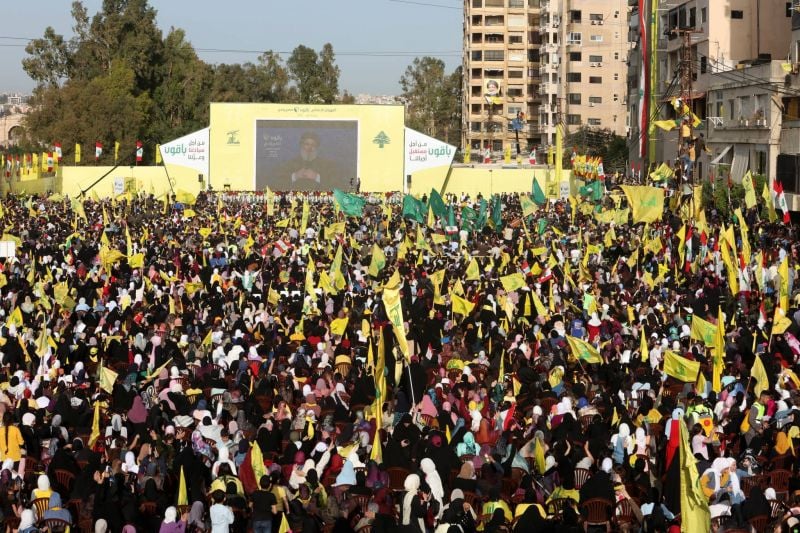
Hezbollah chief Hassan Nasrallah address supporters via a video stream at an election rally in Sour, Lebanon. May 9, 2022. (Credit: Aziz Taher/Reuters)
Want to get the Morning Brief by email? Click here to sign up.
Pope Francis has postponed his trip to Lebanon due to health reasons. The visit was expected in June of this year, but yesterday, sources close to the pope said that he was experiencing pain and difficulty while walking. Lebanon’s Tourism Minister Walid Nassar said yesterday that the visit was expected for June 12 and 13, dates that the Vatican never confirmed, but “In case of postponement, the visit will not be postponed too much, and preparations are continuing.” He added that there is no “political reason” behind the change of plans.
The World Bank has approved a $150 million emergency loan to finance wheat imports to Lebanon. The news was announced yesterday by Economy Minister Amin Salam, who said he had received word that the loan was approved by the World Bank’s board of directors. A spokesperson for the World Bank later confirmed the news to L’Orient Today. At a press conference, Salam reassured the public that Lebanon's central bank is still subsidizing portions of wheat. The loan is pending cabinet approval and comes after the cabinet allocated $15 million of its International Monetary Fund granted Special Drawing Rights to wheat imports in April. Russia’s invasion of Ukraine has hampered the latter’s exports of wheat, a difficult blow for Lebanon, as both Russia and Ukraine top its list of wheat sources.
Hezbollah chief Hassan Nasrallah yesterday accused US official Amos Hochstein of being biased towards Israel in his mediation of maritime border negotiations. While speaking to election rallies in Sour and Nabatieh via a video stream, Nasrallah described Hochstein as “dishonest and compromised, and supportive towards Israel,” adding that the outcome of Lebanese-Israeli negotiations would be unfavorable to Lebanon. Hochstein, who serves as senior advisor for energy security in the Biden administration, was born and raised in Israel, and has served in the Israeli army. Nasrallah described Lebanon’s potential offshore hydrocarbon reserves as “the only way to its salvation from its economic crisis,” going on to claim that drilling would generate billions of dollars in revenue. Former Director General of the Finance Ministry Alain Bifani has said Lebanon’s natural gas reserves could generate $1.5 billion or $2 billion per year at best. Moving to the issue of Hezbollah’s arms, Nasrallah accused rival groups of politicizing the party’s weapons as their main political platform. Nasrallah told his supporters that voting was akin to practicing a “a political July war,” a reference to the war between Lebanon and Israel that took place in July 2006.
The Lebanese diaspora’s voter turnout almost tripled compared to the last election cycle in 2018. More than 135,000 Lebanese living abroad cast their ballots on Friday and Sunday, more than two times the number seen in 2018, which stood at around 50,000. These figures are based on a statement made by officials at the Foreign Ministry on Sunday evening, coming before polling stations had closed. The final official tally has not yet been released. Turnout varied between the 48 countries that participated in the diaspora vote on Sunday, with the United Arab Emirates exceeding 70 percent in both Abu Dhabi and Dubai. In France, turnout was reported at 53 percent around 6 p.m. on election day, with a final number of 71 percent by closing time. Results from the Western Hemisphere, including the United States, Canada and Latin America should be reported soon, as voting was continued much later than in other countries.
In case you missed it, here’s our must-read story from yesterday: “Aley, the unlikely birthplace of protest movements”
*Clarification: An earlier version of this article stated that 48 countries took part in the Lebanese diaspora election. Forty-eight countries voted on Sunday, May 8, and 10 voted on Friday, May 6, bringing the total to 58. The article has been updated to more accurately reflect this information.